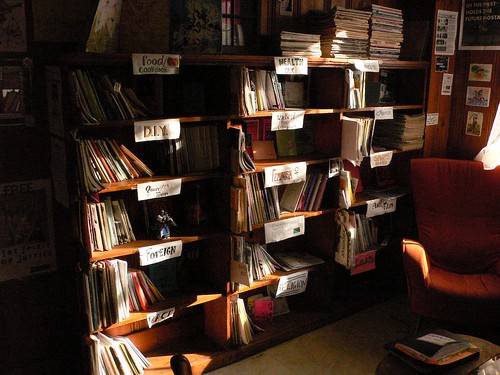
I am a Florida resident now. I live in a place we’ll call Fahrenheit 101 (hey, can’t go pissing off the natives while still seeking employment). Down here they have something called a “Heat Index,” a number you reach by doubling the temperature in Boston and then adding another twenty. My skin is browning, my hair de-browning. I am a short drive away from white-sand beaches dotted with white-haired people. I am one of the youngest in my neighborhood. Most days, I sit on my back patio and watch dolphins play in the [Censored] River, reveling in my newfound (relative) youth.
Were I still a Boston resident, my umbrella would be my closest companion. My skin would be pale, my hair wet. The closest beach would be Revere, and that’s no fun in any weather. I would come down on the nearer-my-god-to-thee side of the median age. I’d sit on my balcony and watch the dark clouds pour more water into the harbor.
But at least I’d be reading a book.
The Brattle Bookstore was right behind my building. Commonwealth Books, steps away from the Emerson Bookstore, which was steps away from the Iwasaki Library, was a four-minute walk. The magnificent BPL at Copley was a mere ten minutes by foot—or 45 by T (if the Green Line was having a good day). I never had to resort to Border’s or Barnes & Noble, because in a one-mile radius from where I lived, there were thousands and thousands of books to browse, borrow, or buy.
There are no bookstores in Fahrenheit 101, Florida.
Allow me to repeat that. There are no bookstores in Fahrenheit 101, Florida. Not one. Not even a mom & pop (or, to be more Florida-appropriate, grandmom & grandpop) joint. The local library has a Paperback Mystery section that is separate from, and nearly as big as, its Fiction section—which itself is stocked with row after row of hardcover mysteries, most of them in large print. Here in Fahrenheit 101, the only books in a one-mile radius from where I live are those stocking the shelves of my neighbors. And I have yet to be invited in.
Help. Into a literary wasteland I’ve fallen, and I can’t get up.
Boston is poetry readings in coffee houses. Fahrenheit 101 is obituaries that rhyme. Boston is sidewalk stalls of used books. Fahrenheit 101 is yard sales featuring complete sets of Guns & Ammo and ATV Magazine. Boston is walking the same streets that Poe, Emerson, and Lowell walked. Fahrenheit 101 is walking the streets only when your monster truck breaks down and no other monster truck stops to help. And Boston is where all of my books are, stashed in a cardboard box in a dark corner of some warehouse, waiting for the moving company to load them onto an eighteen-wheeler.
I know, I know—why didn’t I bring a few for the interim? Because I did not study my new surroundings in advance. I did not Google “Fahrenheit 101 Bookstores,” nor did I browse the [Censored] Library’s online catalogue. And with spotty Internet at my new home, I can’t even order books online. And even if I could, I’m pretty sure that the USPS is collecting all of my mail in giant sacks, and then hurling the sacks into the Charles.
(Speaking of which … if you see, bobbing along in that water, envelopes addressed to me in my own handwriting, and the return addressors are literary magazines, and inside the envelopes are what appear to be 3” x 5” pieces of thin, impersonal paper, please let them continue on into the harbor and out to sea.)
So revel in your books, Bostonians. Sit amongst the Brattle’s outdoor stacks and breathe in the smell of the worn pages. Walk (walk!) to the BPL, choose a title at random, take a seat in a sheltered area of the courtyard, and read a few pages as you listen to the rain pelt the flower petals. Appreciate what you have while you have it, else you’ll turn out like me.
Sorry, grandmom & grandpop, but you leave me no recourse—I’m off to the Barnes & Noble six towns over. If I leave now and catch all the traffic lights, I can be home and reading a new book by tomorrow afternoon. And it’ll only cost $28.50 (excluding gas and aspirin). Which they’ll just take out of my first paycheck. If they’re hiring.
And if I get the job.
--Post contributed by Assistant Fiction Editor, Dave Duhr



















